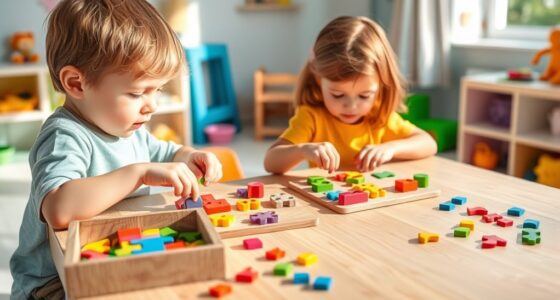To improve language skills in young children, start conversations with open-ended questions and practice active listening. Encouraging open and confident communication supports overall development, while exposure to various language experiences helps expand vocabulary. Reading, rhymes, and language apps can all contribute to enhancing language skills. It’s important to praise correct naming and acknowledge communication efforts to reinforce positive behaviors. Reading plays a key role in language development. Discussing stories and asking questions during reading can improve comprehension. Using open-ended questions and engaging in problem-solving activities can also help develop critical thinking skills. Cultivating communication in early childhood lays the groundwork for academic and social success by enabling children to express themselves and interact with the world.
Key Takeaways
- Engage in daily conversations to enhance language skills.
- Utilize reading, rhymes, and language apps for vocabulary expansion.
- Encourage active listening and maintain eye contact for effective communication.
- Provide opportunities for open communication to build confidence.
- Seek professional help for tailored intervention strategies for language development.
Importance of Early Communication Development
Developing strong communication skills in early childhood is essential for laying the foundation for academic and social success in later years. As a child navigates the formative years of early childhood, their ability to communicate effectively plays a pivotal role in shaping their future interactions and achievements.
The language skills that children develop during this period not only help them express their thoughts and emotions but also enable them to think critically, ask questions, and engage with the world around them.
Encouraging a child to communicate openly and confidently from a young age can greatly aid in their overall development. By engaging in conversations, storytelling, and activities that promote language use, parents, educators, and caregivers can help children strengthen their communication skills.
Through regular interactions and exposure to diverse language experiences, children can enhance their vocabulary, improve their ability to articulate ideas, and develop a deeper understanding of how language functions within social contexts.
In essence, the early years of childhood serve as a critical time for honing communication skills that pave the way for future academic success and positive social relationships.
Strategies for Enhancing Language Skills

To boost language skills in early childhood effectively, consider implementing various strategies that cater to different aspects of communication development. Initiating conversations with open-ended questions is a significant tool for enhancing language skills in children. By encouraging them to think critically and express themselves fully, you're fostering their ability to communicate effectively.
Active listening plays an important role in reinforcing oral language habits. Remember to maintain eye contact and show genuine interest through facial expressions to create a supportive environment for language development. Reading, rhymes, and language apps are valuable resources for expanding vocabulary and improving communication.
Additionally, focusing on phonological awareness, such as practicing the alphabet and recognizing different sounds, is essential for developing oral language skills. If you notice your child struggling with oral language development, seeking professional help can lead to tailored intervention strategies that address their specific needs.
Promoting Positive Communication Behaviors

Encourage your child's positive communication behaviors by praising their efforts and recognizing their achievements in verbal expression. Positive reinforcement plays an essential role in helping children develop healthy communication habits.
Here are some ways to promote positive communication behaviors:
- Praise Correct Naming: When your child accurately names things, offer praise to reinforce their language skills.
- Recognize Communication Efforts: Celebrate your child's attempts at communication, even if they're still learning.
- Encourage Open Communication: Create an environment that values open communication, where your child feels comfortable expressing themselves.
Role of Reading in Language Development

When engaging with your child in reading activities, you play a significant role in nurturing their language development and enhancing their communication skills. Children develop receptive and expressive language skills through regular reading sessions.
As you read a book with your child, discussing the pictures and storyline can enhance language comprehension and expand vocabulary. Asking open-ended questions during reading not only encourages critical thinking but also contributes to communication development.
It's essential to tell your child about the stories and characters, taking turns to engage them actively in the reading process. By helping your child explore various materials, you expose them to different language structures and concepts, laying a strong foundation for communication skills.
Keep in mind these strategies to help your child develop robust language abilities, as your involvement in reading plays a good role in their overall language development.
Fostering Critical Thinking Through Communication

Fostering critical thinking through communication involves prompting deeper thought by asking open-ended questions. Encouraging children to express their opinions and justify their thoughts can greatly enhance their reasoning skills.
Engaging in activities such as storytelling and problem-solving scenarios provides opportunities for young minds to analyze information and form logical conclusions. Through discussions that require reflection, children learn to make connections and develop their ability to think critically.
- By asking open-ended questions, you stimulate reasoning and reflection.
- Engaging in problem-solving scenarios can improve critical thinking skills.
- Encouraging children to express their opinions helps them justify their thoughts and develop their ability to analyze information.
Frequently Asked Questions
What Are 5 Strategies That Can Be Used to Facilitate Effective Communication With Children?
Ask open-ended questions to encourage children's full expression. Be an active listener, using facial expressions and eye contact to validate their efforts. Expand vocabulary through reading and interactive apps. Teach phonological awareness for oral language skills. Seek help if needed.
How Can Good Communication Skills Help You as an Early Childhood Educator?
Good communication skills help you connect with children, parents, and colleagues, creating a positive environment. You can effectively convey information, address behaviors, give feedback, and collaborate with parents, enhancing job performance and supporting children's growth.
What Are the Examples of Communication Development in Early Childhood?
In early childhood, examples of communication development include using sounds, gestures, and facial expressions to express needs. As a caregiver, responding to these efforts is crucial for a child's growth. Encouraging words and modeling communication skills are beneficial.
What Are 5 Good Communication Skills?
You can master communication! Five key skills include active listening, clear expression, empathy, respect, and non-verbal awareness. Adapt your style to different audiences. Practice maintaining eye contact, using tone, and active listening for success.
Conclusion
In the journey of developing communication skills in early childhood, remember that language is the key that opens a world of possibilities.
Just as a bird must learn to sing before it can soar, children must learn to communicate effectively to navigate the complexities of life.
By fostering positive behaviors, promoting literacy, and encouraging critical thinking, you're laying the foundation for a future filled with eloquent expression and meaningful connections.
Keep nurturing those young minds, for they're the storytellers of tomorrow.










